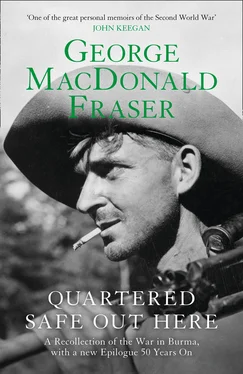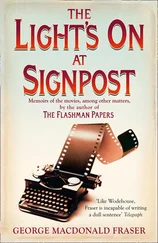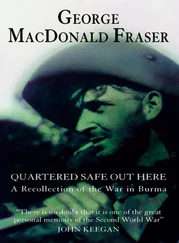“Where the hell ’ave you been?” he blared. “Wanderin’ aboot like a bloody lost soul, what d’ye think yer on?”
“There were bunkers,” I began, but before I could get out another word Nick had shouted “Doon, Jock!” and whipped up his rifle.
How I managed it I have no idea, but I know my feet left the ground and I hit the deck facing back the way I had come. Whatever Nick had seen was in that direction, and I wanted to get a good look at it – I suppose it was instinct and training combined, for I was scrabbling my rifle forward as I fell and turned together. And I can see him now, and he doesn’t improve with age.
Five yards away, not far from where the bunkers must have been, a Jap was looking towards us. Half his naked torso was visible over the lip of the bank – how the hell he had climbed up there, God knows – and he was in the act of raising a large dark object, about a foot across, holding it above his head. I had a glimpse of a contorted yellow face before Nick’s rifle cracked behind me, three quick shots, and I’d got off one of my own when there was a deafening explosion and I was blinded by an enormous flash as the edge of the nullah dissolved in a cloud of dust and smoke. I rolled away, deafened, and then debris came raining down – earth and stones and bits of Jap – and when I could see again there was a great yawning bite out of the lip of the nullah, and the smoke and dust was clearing above it.
“Git doon!” snapped Hutton, as I started to rise. Suddenly, as if by magic, the section were there behind me, on the deck or kneeling, every rifle covering the lip, and Hutton walked forward and looked into the nullah.
“Fook me,” he said. “Land mine. Fook me. Y’awreet, Jock?”
I said I was.
“Wheer th’ell did’e coom frae? The booger!”
I told him, no doubt incoherently, about the bunkers: that I’d checked two and been on the way to the third when Nick had whistled. “It looked empty,” I said.
“Well, it bloody well wasn’t, was it?” he shouted, and I realised he was not only angry, but shaken. “Duke, giddoon theer an’ ’ev a dekko! Rest o’ you, git back in extended line – move!”
Nick was recharging his magazine. I realised that I was trembling. “Land mine?” I said. “Did you hit it?”
“Nivver,” said he. “Ah hit him, though. Naw, he would have it wired. Suicide squad, waitin’ to blaw oop anyone that cam’ near ’im.” He grinned at me. “Might ha’ bin thee, Jock boy. Ye shoulda give us a shout, man.”
I explained why I hadn’t, and he shook his head. “Nivver ga in on yer own, son. That’s ’ow ye finish up dyin’ Tojo’s way. Ye wanna die yer own fookin’ way.”
“Git fell in, you two!” It was Hutton again. “Standin’ aboot natterin’ wid yer thumbs in yer bums an’ yer minds in neutral! Awreet, Duke? Ad-vance! Coom on, it’ll be bloody dark in a minute!”
That evening, when we had dug in and were sitting round the fire eating our Maconochie’s, 8Hutton, who had been talking apart with the Duke, called me over. He was jotting in his notebook.
“Three boonkers, reet?” he said. “What was in the two ye looked in?”
“Nothing, sarn’t. Well, there was a punji in one, and a couple of Jap mess tins. Nothing at all in t’other.”
“Nowt at a’?”
“No … well, nothing but a Kooa packet over in a corner. Empty.”
He didn’t glance up from his notes, but his glance flicked sideways for a second, and out of the tail of my eye I caught the Duke’s almost imperceptible nod. Hutton finished writing, and when he looked up I’ll swear there was relief in the battered face. It took me a moment to understand why.
“Awreet, Jock.” Then suddenly he was angry again. “Nivver – nivver go in a boonker by yersel!” He stabbed me in the chest. “Mallum? 9Git yer mucker to cover you, or git me! Ye’re not fookin’ Gary Cooper!” Irrelevantly, it seemed to me, he added: “Fookin’ Scotsmen!” He feinted a jab at my chin. “Reet, son, fall oot.”
By this time the gastronomes round the fire were clamouring for their dessert. Grandarse produced a can of condensed milk which he punctured with a pig-sticker bayonet, while Corporal Little set to work on my gallon tin with his jack-knife.
Grandarse, mess-tin in hand, smacked his lips. “By Christ, eh! Peaches an’ Nessles, w’at? Aye, that’ll joost aboot do!”
“Might be pears,” suggested the Duke.
“Or pineapple,” I said.
“Ah don’t give a fook w’at it is,” said Grandarse, Penrith’s answer to Lucullus. “Eh, tho’, mebbe it’s fruit salad!”
It wasn’t. It was carrots, in brine. Inevitably, since I’d been carrying the tin, they blamed me.
Back in Blighty, or even out of the line, a soldier’s first loyalty was to his regiment, and even the most cynical reluctant conscript was conscious of belonging to something special. If he came from the regimental area, the tie was all the stronger; he could call himself a Devon, an Argyll, a Gloucester, or a Middlesex, and take some pride in belonging to the Bloody Eleventh, the Thin Red Line, the Back-to-Backs, or the Diehards, as those regiments were nicknamed; he would probably know how they got them. And regimental pride would stay with him, as I’m sure it does still, even after amalgamation has played havoc with the old territorial system.
On active service, in my experience, the loyalty, or perhaps I should call it dependence, narrowed down to the infantry section of ten. Each battalion normally had four rifle companies (apart from headquarter and perhaps support companies for transport and 3-inch mortars); each company was split into three platoons, each commanded by a lieutenant and sergeant; and each platoon into three sections. In parade-ground theory, a section consisted of ten men (corporal, lance-corporal, Bren gunner, and seven riflemen, one of whom was the Bren gunner’s “number two”), but in practice the strength was more likely to be about eight; six was the operational minimum. 1But whatever its strength, the section was the essential unit, operating as a team; of course on platoon operations it acted in concert with the two other sections; and half-company, company, and battalion actions were common also; but whatever the size of the action it was the section that mattered to the private soldier. It was his military family; those seven or eight other men were his constant companions, waking, sleeping, standing guard, eating, digging, patrolling, marching, and fighting, and he got to know them better, perhaps, than anyone in his whole life except his wife, parents, and children. He counted on them, and they on him.
Within the section he would have his own immediate comrade, his “mucker”, known in some units as oppos or mates. Our own battalion was predominantly Cumbrian, and the men from the west coast called each other “marrow”, 2pronounced marra. I had three muckers in the course of the campaign, as a result of death and promotion. There was nothing official about the mucker arrangement, it just happened of necessity and mutual consent, and is certainly as old as war itself.
My first mucker was the section leader, Corporal Little – no doubt because at nineteen I was the youngest and least experienced man in the section. He was a Cumbrian by birth and race, which is to say he was the descendant of one of the hardest breeds of men in Britain, with warfare (if not soldiering) bred into him from the distant past. Like their enemies on the Scottish side of the frontier, the Cumbrians of old lived by raid, cattle theft, extortion, and murder; in war they were England’s vanguard, and in peace her most unruly and bloody nuisance. They hadn’t changed much in four centuries, either; the expertise in irregular warfare, to say nothing of the old reiver spirit of “nothing too hot or too heavy”, was strong in the battalion; their names (and nicknames) are to be found in the bills of warden courts four centuries ago, opposite charges of slaughter, spoil, ambush, and arson, and if you could have seen Nine Section, honestly, you wouldn’t have been a bit surprised. To all of which must be added the virtues of endurance, courage, and deep tribal loyalty; they were, as the chronicler said of their forefathers, “a martial kind of men”.
Читать дальше












